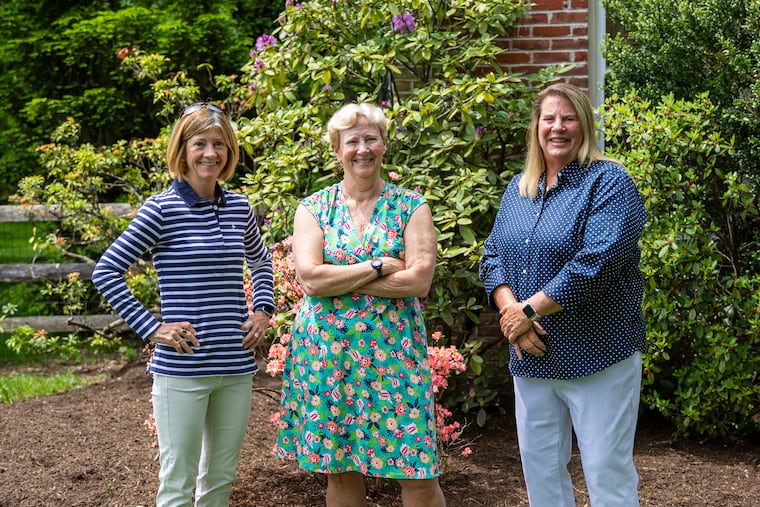Three Philadelphia-area women who changed the game in athletic administration set to retire
Ginny Hoffman at Germantown Academy, Regina Buggy at Episcopal Academy and Barb Clarke at Merion Mercy helped create more opportunities for females in athletic participation and administration.

The idea seemed radical but realistic to Ginny Hofmann, a ninth grader in gym class at Cheltenham Junior High in the late 1960s.
“We were outside, playing a game, and I’m thinking, ‘Wait a minute here,’” Hofmann recalled. “I loved sports. I loved being outside. I’m thinking, ‘This is a job?’”
Sports became more than just a job for Hofmann. It became more than just a job for Gina Buggy and Barb Clarke, too. It became a career and a calling.
They all were athletes. They all were coaches. And they all, combined, spent more than 100 years in athletic administration at secondary schools in Southeastern Pennsylvania, changing perceptions of the previously male-dominated profession by applying lessons learned on playing fields: hard work, diligence, persistence.
“We all came along in an era where there were limited opportunities for women,” Buggy said. “Sports taught us that we could do anything that a boy could do. It built strength of character, courage, and most of all the willingness to be open to challenges.”
All three women plan to retire at the end of the school year.
“I can tell you from firsthand knowledge that these three women are the absolute definition of the consummate professional,” said Joe Ryan, supervisor of officials for multiple sports in the region. “Top-shelf, first-class all the way. They will all be seriously missed in scholastic athletic circles in the Philly area.”
Hofmann became an athletic director at Germantown Academy in 1983. Buggy became the girls’ athletic director at Episcopal Academy in 1986 and took charge of the overall program in 1993. Clarke has served as the athletic director at Merion Mercy since 1975, although she didn’t have the title until 1985.
“Before that, I did the job of an athletic director, but we didn’t officially have one,” Clarke said.
Playing all day long
Clarke played field hockey, basketball, and tennis at School of the Holy Child in Rosemont and Lynchburg (Va.) University. She joined Merion Mercy as a health and physical education teacher and coach, as well as de facto athletic director, right out of college.
“I loved sports ever since I was a little girl,” Clarke said. “When I was thinking about what I wanted to do, I used to think, ‘Wouldn’t it be fun just to play all day long?’”
She coached field hockey, basketball, and track at the all-girls’ school. And along the way, Merion Mercy steadily expanded its athletic program, growing from three sports to 12, developing a national-caliber rowing program, attracting more dedicated athletes.
“Barbara Clarke is forever woven into the fabric of MMA athletics,” head of school Laura Farrell said. “Her influence at Merion Mercy has been profound as she built our program from the ground up.”
'Small woman, broad shoulders’
Buggy was a star athlete at Plymouth Whitemarsh High and Ursinus College, and a member of the 1984 USA field hockey team that won a bronze medal at the Olympic Games in Los Angeles.
She was the head coach of Episcopal Academy’s field hockey team from 1986 until the end of last season. Her teams won 479 games as well as 13 Inter-Academic League titles and two Pennsylvania Independent School Athletic Association (PISAA) crowns.
She became the school’s athletic director for girls’ sports in 1986, two years after Episcopal Academy switched from an all-male model to a coed one. She became the school’s overall athletic director in 1993 and helped to oversee the school’s move from Merion to Newtown Square in 2006.
Episcopal Academy associate athletic director Jim Farrell, who has worked with Buggy for 34 years, said her coaching background made her an ideal administrator.
“When you’re one of her coaches you are part of Gina Buggy’s team,” Farrell said, fighting back tears. “She has gone to bat for her coaches so many times … For a small woman, she has such broad shoulders.”
‘On stage for 44 years’
Hofmann played sports at Cheltenham High but jokes that she wasn’t good enough to play varsity at West Chester University.
“They were such a powerhouse," Hofmann said.
She began at Germantown Academy in 1976, right out of college, serving as a physical education teacher and coach of multiple sports, including a top-level lacrosse team. She guided the athletic program through massive expansion, adding sports such as soccer, coed ice hockey, cross country, and water polo.
She is renowned at the school for her leadership, can-do pep, and the morning Sports Report delivered over the public-address system.
“I often think that, in another life, Ginny would have been a Tony Award-winning star on Broadway,” GA head of school Rich Schellhas said. “How lucky are we that she has made GA her stage for 44 years, that she has selflessly dedicated her life to making GA a better school?”
Hofmann plans to spend more time at the Jersey shore and travel. She hopes to someday visit Russia.
Clarke also plans to spend more time at the Jersey Shore and work on her golf game. She doesn’t have a detailed plan for her future.
“I want to see where life takes me,” Clarke said.
Buggy might take the same approach.
“I’m healthy enough to explore life outside of high school,” Buggy said.
All three women are reluctant to regard themselves as trailblazers. But they’ve been around long enough to have played pivotal roles in the burgeoning growth of opportunities in sports for females, in participation and administration.
“I remember when I first went to a [national] convention, it seemed like every other person there was a football coach,” Hofmann said. “It was an old-boys’ club. I got a lot of ‘little lady’ in those days.
“Things have changed a lot. It’s been exciting for all of us to see.”